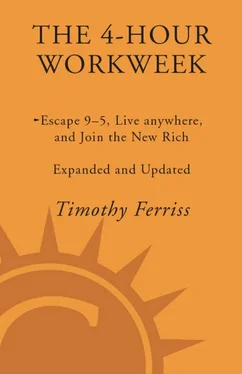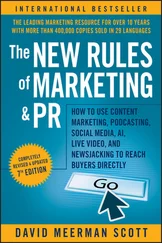Timothy Ferriss - The 4-Hour Workweek - Escape 9–5, Live Anywhere, and Join the New Rich - Expanded and Updated
Здесь есть возможность читать онлайн «Timothy Ferriss - The 4-Hour Workweek - Escape 9–5, Live Anywhere, and Join the New Rich - Expanded and Updated» весь текст электронной книги совершенно бесплатно (целиком полную версию без сокращений). В некоторых случаях можно слушать аудио, скачать через торрент в формате fb2 и присутствует краткое содержание. Жанр: Прочая научная литература, на английском языке. Описание произведения, (предисловие) а так же отзывы посетителей доступны на портале библиотеки ЛибКат.
- Название:The 4-Hour Workweek: Escape 9–5, Live Anywhere, and Join the New Rich - Expanded and Updated
- Автор:
- Жанр:
- Год:неизвестен
- ISBN:нет данных
- Рейтинг книги:3 / 5. Голосов: 1
-
Избранное:Добавить в избранное
- Отзывы:
-
Ваша оценка:
- 60
- 1
- 2
- 3
- 4
- 5
The 4-Hour Workweek: Escape 9–5, Live Anywhere, and Join the New Rich - Expanded and Updated: краткое содержание, описание и аннотация
Предлагаем к чтению аннотацию, описание, краткое содержание или предисловие (зависит от того, что написал сам автор книги «The 4-Hour Workweek: Escape 9–5, Live Anywhere, and Join the New Rich - Expanded and Updated»). Если вы не нашли необходимую информацию о книге — напишите в комментариях, мы постараемся отыскать её.
The 4-Hour Workweek: Escape 9–5, Live Anywhere, and Join the New Rich - Expanded and Updated — читать онлайн бесплатно полную книгу (весь текст) целиком
Ниже представлен текст книги, разбитый по страницам. Система сохранения места последней прочитанной страницы, позволяет с удобством читать онлайн бесплатно книгу «The 4-Hour Workweek: Escape 9–5, Live Anywhere, and Join the New Rich - Expanded and Updated», без необходимости каждый раз заново искать на чём Вы остановились. Поставьте закладку, и сможете в любой момент перейти на страницу, на которой закончили чтение.
Интервал:
Закладка:
Focus on one eye and be sure to blink occasionally so you don’t look like a psychopath or get your ass kicked.
In conversation, maintain eye contact when you are speaking. It’s easy to do while listening.
Practice with people bigger or more confident than yourself. If a passerby asks you what the hell you’re staring at, just smile and respond, “Sorry about that. I thought you were an old friend of mine.”
Step II: E is for Elimination
One does not accumulate but eliminate. It is not daily increase but daily decrease. The height of cultivation always runs to simplicity.
—BRUCE LEE5. The End of Time Management.
ILLUSIONS AND ITALIANS
Perfection is not when there is no more to add, but no more to take away.
—ANTOINE DE SAINT-EXUPÉRY, pioneer of international postal flight and author of Le Petit Prince (The Little Prince)
It is vain to do with more what can be done with less.
—WILLIAM OF OCCAM (1300–1350), originator of “Occam’s Razor”
Just a few words on time management: Forget all about it.
In the strictest sense, you shouldn’t be trying to do more in each day, trying to fill every second with a work fidget of some type. It took me a long time to figure this out. I used to be very fond of the results-by-volume approach.
Being busy is most often used as a guise for avoiding the few critically important but uncomfortable actions. The options are almost limitless for creating “busyness”: You could call a few hundred unqualified sales leads, reorganize your Outlook contacts, walk across the office to request documents you don’t really need, or fuss with your BlackBerry for a few hours when you should be prioritizing.
In fact, if you want to move up the ladder in most of corporate America, and assuming they don’t really check what you are doing (let’s be honest), just run around the office holding a cell phone to your head and carrying papers. Now, that is one busy employee! Give them a raise. Unfortunately for the NR, this behavior won’t get you out of the office or put you on an airplane to Brazil. Bad dog. Hit yourself with a newspaper and cut it out.
After all, there is a far better option, and it will do more than simply increase your results—it will multiply them. Believe it or not, it is not only possible to accomplish more by doing less, it is mandatory.
Enter the world of elimination.
How You Will Use Productivity
Now that you have defined what you want to do with your time, you have to free that time. The trick, of course, is to do so while maintaining or increasing your income.
The intention of this chapter, and what you will experience if you follow the instructions, is an increase in personal productivity between 100 and 500%. The principles are the same for both employees and entrepreneurs, but the purpose of this increased productivity is completely different.
First, the employee. The employee is increasing productivity to increase negotiating leverage for two simultaneous objectives: pay raises and a remote working arrangement.
Recall that, as indicated in the first chapter of this book, the general process of joining the New Rich is D-E-A-L, in that order, but that employees intent on remaining employees for now need to implement the process as D-E-L-A. The reason relates to environment. They need to Liberatethemselves from the office environment before they can work ten hours a week, for example, because the expectation in that environment is that you will be in constant motion from 9–5. Even if you produce twice the results you had in the past, if you’re working a quarter of the hours of your colleagues, there is a good chance of receiving a pink slip. Even if you work 10 hours a week and produce twice the results of people working 40, the collective request will be, “Work 40 hours a week and produce 8 times the results.” This is an endless game and one you want to avoid. Hence the need for Liberationfirst.
If you’re an employee, this chapter will increase your value and make it more painful for the company to fire you than to grant raises and a remote working agreement. That is your goal. Once the latter is accomplished, you can drop hours without bureaucratic interference and use the resultant free time to fulfill dreamlines.
The entrepreneur’s goals are less complex, as he or she is generally the direct beneficiary of increased profit. The goal is to decrease the amount of work you perform while increasing revenue. This will set the stage for replacing yourself with Automation, which in turn permits Liberation.
For both tracks, some definitions are in order.
Being Effective vs. Being Efficient
Effectiveness is doing the things that get you closer to your goals. Efficiency is performing a given task (whether important or not) in the most economical manner possible. Being efficient without regard to effectiveness is the default mode of the universe.
I would consider the best door-to-door salesperson efficient—that is, refined and excellent at selling door-to-door without wasting time—but utterly ineffective. He or she would sell more using a better vehicle such as e-mail or direct mail.
This is also true for the person who checks e-mail 30 times per day and develops an elaborate system of folder rules and sophisticated techniques for ensuring that each of those 30 brain farts moves as quickly as possible. I was a specialist at such professional wheel-spinning. It is efficient on some perverse level, but far from effective.
Here are two truisms to keep in mind:
Doing something unimportant well does not make it important.
Requiring a lot of time does not make a task important.
From this moment forward, remember this: What you do is infinitely more important than how you do it. Efficiency is still important, but it is useless unless applied to the right things.
To find the right things, we’ll need to go to the garden.
Pareto and His Garden: 80/20 and
Freedom from Futility
What gets measured gets managed.
—PETER DRUCKER, management theorist, author of 31 books, recipient of Presidential Medal of Freedom
Four years ago, an economist changed my life forever. It’s a shame I never had a chance to buy him a drink. My dear Vilfredo died almost 100 years ago.
Vilfredo Pareto was a wily and controversial economist-cum-sociologist who lived from 1848 to 1923. An engineer by training, he started his varied career managing coal mines and later succeeded Léon Walras as the chair of political economy at the University of Lausanne in Switzerland. His seminal work, Cours d’economie politique , included a then little-explored “law” of income distribution that would later bear his name: “Pareto’s Law” or the “Pareto Distribution,” in the last decade also popularly called the “80/20 Principle.”
The mathematical formula he used to demonstrate a grossly uneven but predictable distribution of wealth in society—80% of the wealth and income was produced and possessed by 20% of the population—also applied outside of economics. Indeed, it could be found almost everywhere. Eighty percent of Pareto’s garden peas were produced by 20% of the peapods he had planted, for example.
Pareto’s Law can be summarized as follows: 80% of the outputs result from 20% of the inputs. Alternative ways to phrase this, depending on the context, include:
80% of the consequences flow from 20% of the causes.
Читать дальшеИнтервал:
Закладка:
Похожие книги на «The 4-Hour Workweek: Escape 9–5, Live Anywhere, and Join the New Rich - Expanded and Updated»
Представляем Вашему вниманию похожие книги на «The 4-Hour Workweek: Escape 9–5, Live Anywhere, and Join the New Rich - Expanded and Updated» списком для выбора. Мы отобрали схожую по названию и смыслу литературу в надежде предоставить читателям больше вариантов отыскать новые, интересные, ещё непрочитанные произведения.
Обсуждение, отзывы о книге «The 4-Hour Workweek: Escape 9–5, Live Anywhere, and Join the New Rich - Expanded and Updated» и просто собственные мнения читателей. Оставьте ваши комментарии, напишите, что Вы думаете о произведении, его смысле или главных героях. Укажите что конкретно понравилось, а что нет, и почему Вы так считаете.












